Do you want to understand the INFJ functions in-depth? What are the INFJ functions that differentiate the INFJs (rarest personality type in the world) from the rest 15 Myers-Briggs personality types? In the previous post, we discussed the perceiving INFJ functions that help INFJs perceive the world around them.
This post will discuss the judging INFJ functions that INFJs use to make decisions. If you have read the previous post about the four perceiving INFJ cognitive functions, you would have understood the eight function model by John Beebe. However, if you haven’t read it, I highly recommend you read it now, as I will be using the same model to get deeper into the judging INFJ functions.
Table of Contents
What are the Judging INFJ Functions?
There are four judging functions that INFJs and every other MBTI personality type uses it. The only difference is the unique archetypes or the unique roles assigned to each of the 16 personality types.
Before we dive deep into a detailed explanation of all the judging INFJ functions, let’s have a quick rundown and a brief description of each of them.
- Extraverted Feeling (Fe) – Concerend about what others are feeling.
- Introverted Feeling (Fi) – Concerned about what you’re feeling inside.
- Introverted Thinking (Ti) – Concerned about what you’re internally thinking.
- Extraverted Thinking(Te) – Concerened about how others are thinking commonly.
Now, we will touch upon each of these judging functions and discuss with examples how these judging functions specifically impact the INFJ personality type.
Extraverted Feeling (Fe)
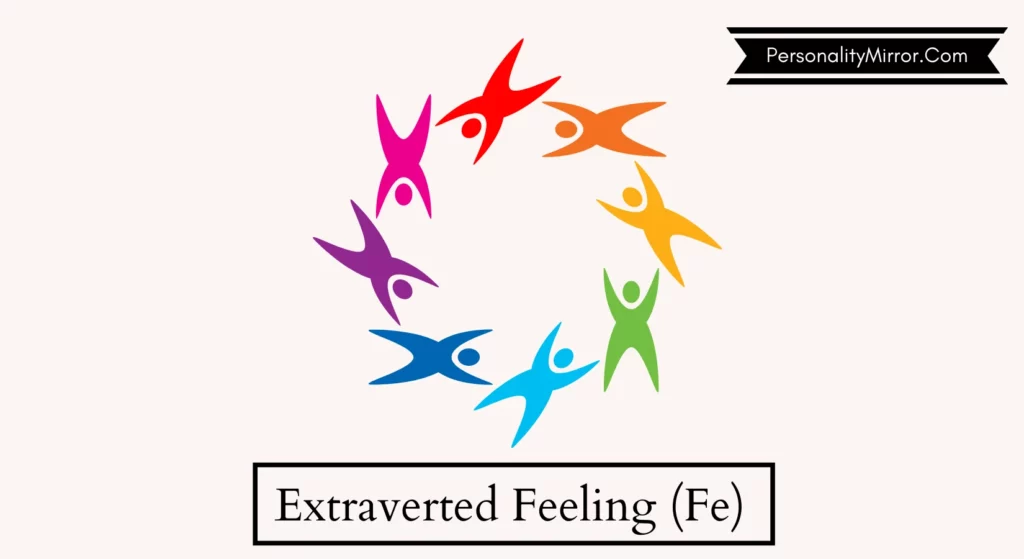
What is Extraverted Feeling (Fe)?
You can sum up Extraverted Feeling (Fe) in the following quote:
All for one, and One for all
A phrase that emphasizes solidarity and support within a group; the group will support its members and its members will support the group. The phrase was popularized in the novel The Three Musketeers, by Alexandre Dumas. Source
Extraverted Feeling (Fe) is a judging function that helps you to make decisions based on the feelings that are external to you. The term ‘Extraverted’ is used in Extraverted Feeling (Fe) because it refers to the decision-making process that is outwardly directed. At the same time, this decision-making process is visible to others.
In simple words, Extraverted Feeling (Fe) refers to understanding the feelings of others around you.

The eight personality types with Extraverted Feeling (Fe) as their primary cognitive function are more in touch with others’ feelings than what they feel inside.
Let’s understand the role of Extraverted Feeling (Fe) in the INFJ personality type.
Role of Extraverted Feeling (Fe) in the INFJ personality Type
For INFJs, Extraverted Feeling (Fe) plays the role of Parent (Father/Mother as per John Beebe’s eight-function model). It’s also known as the auxiliary function in the literature of Myers-Briggs personality theory.
As we discussed the INFJ perceiving functions in the previous post, the dominant cognitive function of an INFJ is Introverted Intuition (Ni). So, INFJs have an intuitive preference for perceiving data from the external world.
Once the data has been perceived, Extraverted Feeling (Fe) is the first judging function that INFJs use to make decisions and judgments.
As an Extraverted Feeling (Fe) parent, INFJs are naturally inclined towards taking care of others’ feelings. They gain their intuitive understanding with their Hero Ni and focus on solving the other’s problems with their Fe parent.
Let’s dig deeper into how Extraverted Feeling (Fe) impacts the INFJ personality type and discuss its strength and weakness.
Strength, Weakness and Overall Impact of Extraverted Feeling (Fe) in the INFJ personality type
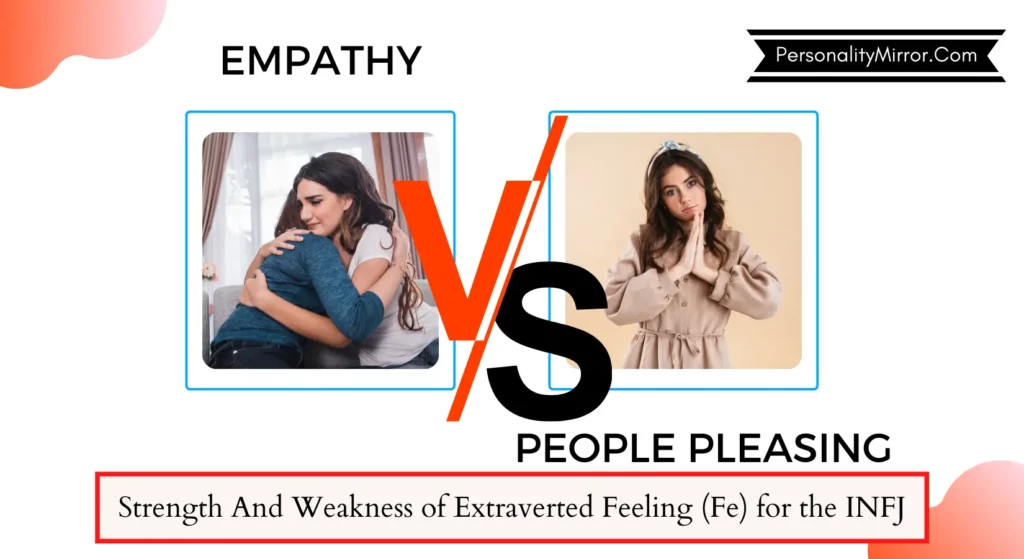
Strength – Empathy
It’s natural for an INFJ to absorb others’ feelings. Make an INFJ sit with a group of people gathered for a specific occasion. For example, celebrating a birthday party with group members cheering or attending a funeral ceremony with group members grieving and shedding tears.
In both scenarios, INFJs will inadvertently absorb their feelings and automatically get synced with the group’s emotions. It doesn’t require effort for an INFJ to get into the shoes of another person. It’s the reason why INFJs excel in counseling.
Weakness – People Pleasing
The biggest disadvantage of a primary Extraverted Feeling (Fe) user is that they’re more prone to people-pleasing behavior. INFJs, being the Fe parents, know quite well what the other person needs and how they can help make them happy.
It works for the INFJ but mainly at the expense of their happiness. Ask yourself this question – How many times have you sacrificed your emotional well-being to ensure others around you are well taken care of? If you’re an INFJ, you must have been familiar with several such instances.
It’s natural for you to absorb external feelings and use your Fe parent to mitigate others’ problems. But when others don’t reciprocate you the same way, or when their values in life are different from yours, the caring process becomes one-sided.
You start believing it’s your responsibility to care for their feelings even if your feelings, needs, and priorities are ignored and neglected. It’s how people-pleasing behavior manifests in INFJs.
What is the overall impact of Extraverted Feeling (Fe) in the INFJ personality type?
INFJs understand the world by understanding how people commonly feel in different scenarios. Primary Extraverted Feeling (Fe) users, including INFJs, operate on a code of ethics. They understand what is socially acceptable (Feeling wise) and what is not. And they navigate through life with this understanding.
INFJs study the socio-emotional impact of various events and actions. And it serves as the reference base to frame interactions with the world.
You’re a Fe parent. It’s your natural responsibility to take care of others’ feelings. You feel fulfilled helping others, and you know pretty well that empathy is the greatest strength you can offer to the world.
Now, if you want to live the most fulfilling INFJ life, the secret behind it is to learn to do it in a healthy way.
Introverted Feeling (Fi)
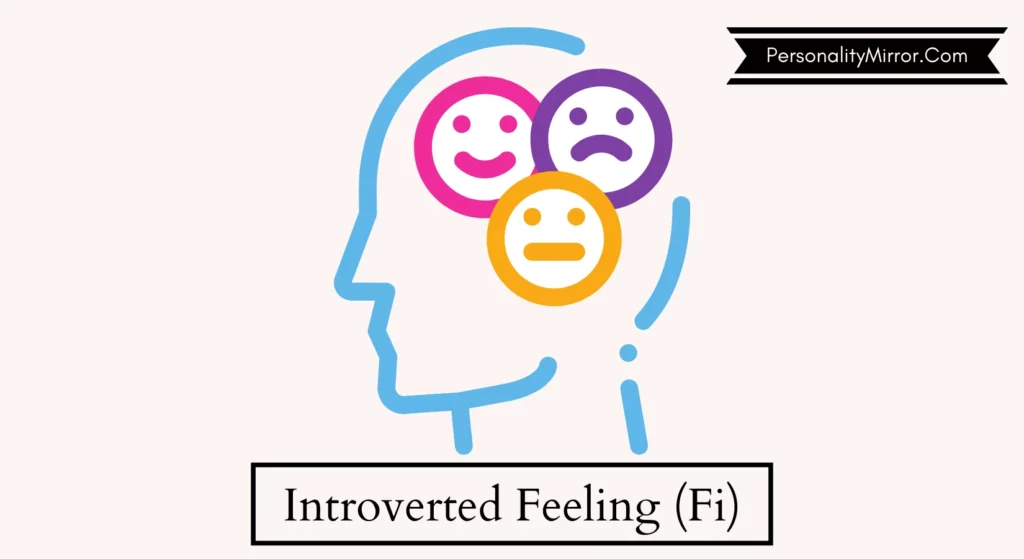
What is Introverted Feeling (Fi)?
Introverted Feeling (Fi) is a judging function that helps you make decisions based on your internal feelings, morals, and values. Fi decision-making is inwardly focused. Thus, it’s not visible to others.
In simple words, Introverted Feeling (Fi) is the emotion that you experience within yourself.

All the eight personality types who have Introverted Feeling (Fi) as their primary cognitive function are more value-oriented. They operate on a code of morals that they subjectively define through their life experiences.
Let’s discuss the role Introverted Feeling (Fi) plays in the INFJ personality type.
Role of Introverted Feeling (Fi) for the INFJ personality type
For INFJs, Introverted Feeling (Fi) plays the role of critical parent (Senex/Witch as per John Beebe’s eight-function model). It’s a shadow function, and it functions in the unconscious.
Since Fi is a shadow function for INFJs, they find it difficult to understand what emotions they’re going through. Also, since it plays the role of a Critical parent, INFJs are more self-critical of themselves than the primary Fi users.
You should not be mistaken that Introverted Feeling (Fi) being a shadow function doesn’t influence the INFJ personality type. It has a tremendous influence on the decision-making process of INFJs. But it requires conscious effort to tap into this shadow function and use it to your advantage.
Let’s understand how we can use Introverted Feeling (Fi) to better our lives.
Strength, Weakness and Overall Impact of Introverted Feeling (Fi) in the INFJ personality type

Strength – Emotional Clarity
When you’re able to tap into Introverted Feeling (Fi), you’ll have a better understanding of your emotions.
Your actions and choices in life are determined by the micro-decisions you make every moment, either consciously or on an auto-pilot basis. And your decisions are influenced by the emotions that you experience within yourself.
As we discussed, Introverted Feeling (Fi) refers to the various shades of emotions that you experience within yourself. If you can tap into Fi, you gain more clarity about what you’re precisely feeling inside.
Gaining emotional clarity helps you understand your values, needs, interests, and desires in life. It allows you to break free from the unhealthy patterns that keep you stuck in never-ending loops of misery.
Weakness – Self-Doubt
The role of a critical parent in all 16 personality types is to set limits and belittle the cognitive function that’s associated with it. As Introverted Feeling (Fi) plays the role of critical parent, it’s entirely natural for you to doubt and second-guess your emotions, values, and personal desires in life.
The first step to work on your weakness is to accept it. You have to admit that you are far more biased towards yourself than almost all personality types. You set impossibly high standards for yourself because you’re unsure about your self-worth. And you seek this confirmation from the external world through Extraverted Feeling (Fe).
To develop this weakness, you have to tap into your shadow, Introverted Feeling (Fi). Unfortunately, you can’t grab an intuitive understanding of Fi unless you spend time with the primary Fi users (ENFPs, INFPs, ESFPs, ISFPs). Ask them deep questions about how they view life and their values.
The more you spend time with them consciously noticing their personality traits, the easier it becomes for you to tap into your shadow Introverted Feeling (Fi). Journalling and recording audio memos are great ways to express your inner thoughts and feelings. It will significantly help you to find emotional clarity within yourself.
What is the overall impact of Introverted Feeling (Fi) in the INFJ personality type?
Calling out others’ selfish intentions – Introverted Feeling (Fi) critical parent criticizes their own values and condemns others for not holding themselves up to the high standards that the INFJ prefers. It may lead to the development of self-righteous behavior within INFJs. And eventually, it will lead to the famous INFJ door-slamming even when it’s not called for.
Having extremely high expectations from themselves and their relationships – As you frequently berate and belittle yourself, you will not feel satisfied in life unless you have achieved something that you never expected before. Doing simple things won’t give you joy in life, as you will be fixated on self-condemnation whenever you commit a mistake. The key to getting rid of unhealthy expectations is to come to terms with your reality.
Creation of the Fi-Si loop in INFJs – Have you ever noticed feeling miserable just by recalling some of your undesirable past life events? It happens due to the shadow Fi-Si loop running in your unconscious.
Introverted Sensing (Si) playing the demonic role attempts to recall the sensory details of your past’s random negative, unpleasant life experiences. Introverted Feeling (Fi) critically reminds you of the uncomfortable emotions you felt during that event. The shadow Fi-Si loop in INFJs takes you back to your past and makes you relive those dreadful life experiences, finally making you feel more miserable and helpless.
To break free from the Fi-Si loop, you need to tap into your shadow Extraverted Intuition (Ne) and seek possibilities that show you a bright picture.
Introverted Thinking (Ti)
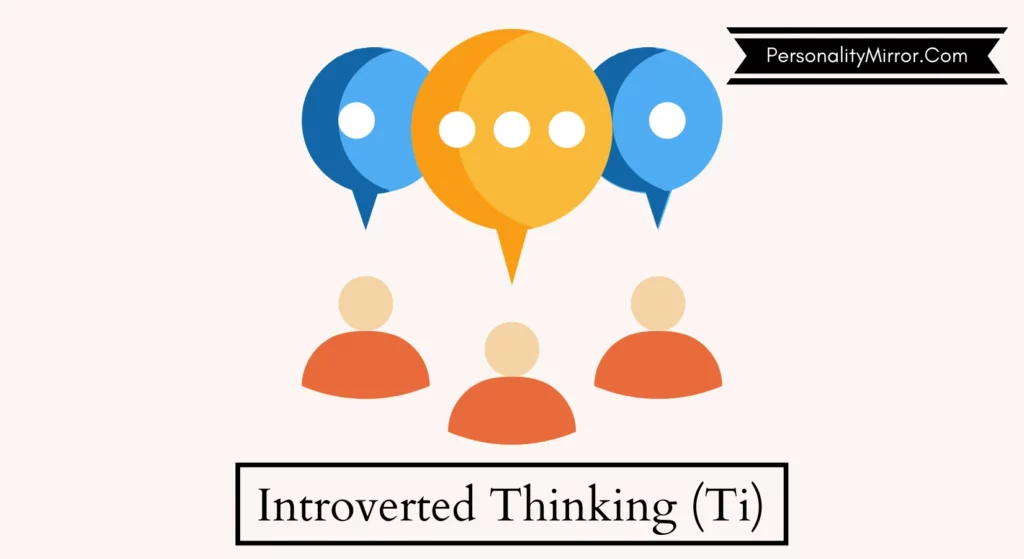
What is Introverted Thinking (Ti)?
Introverted Thinking (Ti) is a judging function that helps you make logical judgments using your internal logic.
It looks for logical consistency and how individual logical ideas intersect together to serve a bigger purpose.
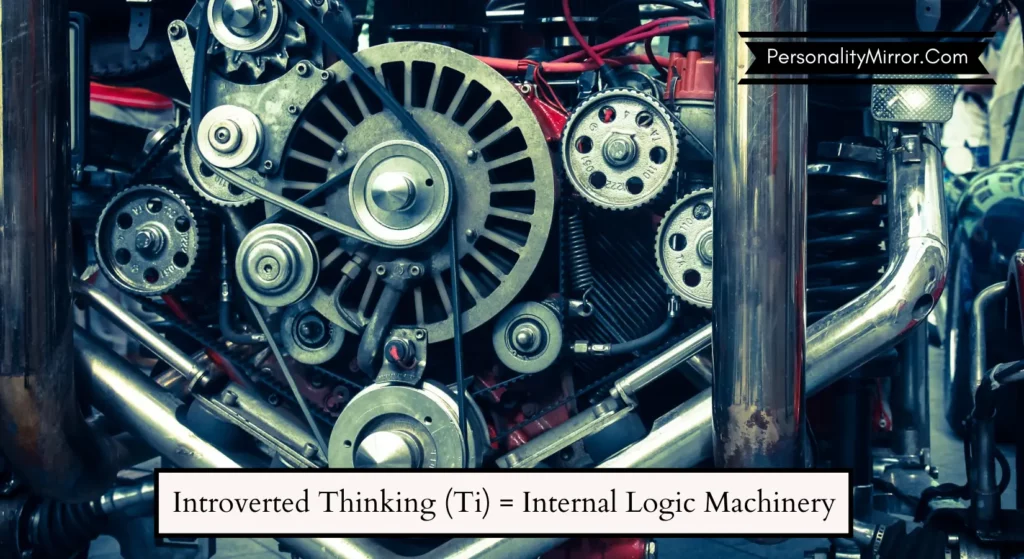
Introverted Thinking (Ti) is called ‘Introverted’ because the decision-making process is inwardly focused and is not visible to others. Introverted Thinking (Ti) is a highly creative cognitive function that seeks to create new logical pathways to achieve goals.
Introverted Thinking (Ti) doesn’t require external intervention for its functioning. Instead, it relies upon its consistent hit and trial iterations to understand the meaning behind each element and attempts to connect them all together to create a significant logical connection.
Role of Introverted Thinking (Ti) in the INFJ personality type
Introverted Thinking (Ti) plays the role of ‘Eternal Child’ (Puer/Puella according to John Beebe’s eight function model) or the tertiary role (According to the Myers-Briggs theory) in the INFJ personality.
INFJs use Introverted Thinking (Ti) as a judging function to make logic-based decisions. However, introverted Thinking (Ti) for INFJs is not as effective as Extraverted Feeling (Fe), and INFJs use it in creative, recreational, and playful endeavors.
At the same time, Introverted Thinking (Ti) playing the child role offers the INFJ a level of nerdy unbiased innocence to pursue complex matters and dig deeper to reach its deepest roots. Introverted Intuition (Ni) offers the big intuitive picture to INFJs, while Introverted Thinking (Ti) helps INFJs find the logical connections between them.
The endless curiosity to understand logical explanations and the meaning behind everything is fueled by its Child Ti.
Strength, Weakness and Overall Impact of Introverted Thinking (Ti) in the INFJ personality type
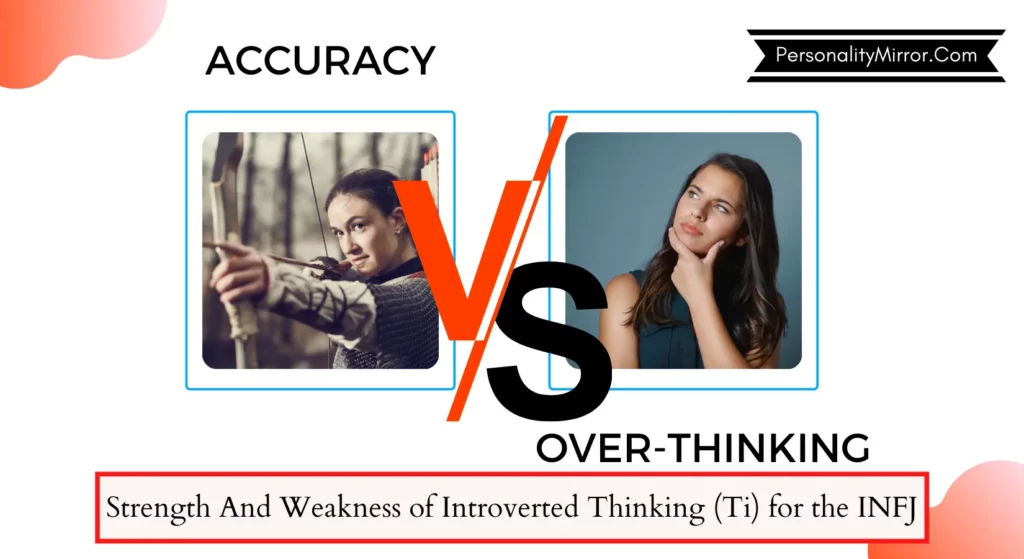
Strength – Accuracy
Introverted Thinking (Ti) playing the tertiary function gives you the edge to reach accurate conclusions. Though it requires time to process things individually and connect them all together, the results are pretty accurate if you’re exposed to the right amount of information.
Introverted Thinking (Ti) uses deductive logical reasoning to find its answers. It uses mathematical logic to make calculations that can never go against the laws of physics. You can only be inaccurate if you have not considered all the potential possibilities. Otherwise, when correct, Ti logic will achieve you the perfect outcomes.
Let’s understand Ti accuracy with some accurately relatable examples.
For INFJs, truth refers to accuracy. So, for example, even if you threaten an INFJ(also healthy Ti users) to death, no one can convince them that 1≠1 and 1+1≠2, as long as number systems exist. It means if specific logic applies to me as a human, then the same logic will also apply to you as long as you’re a human like me.
INFJs, when healthy, naturally believe in the principle of reciprocity and karma. INFJs strongly believe in the following quote:
What goes comes around you.
The above quote is not at all related to the matter of ethics, morals, or principles. It’s validated by logical consistency.
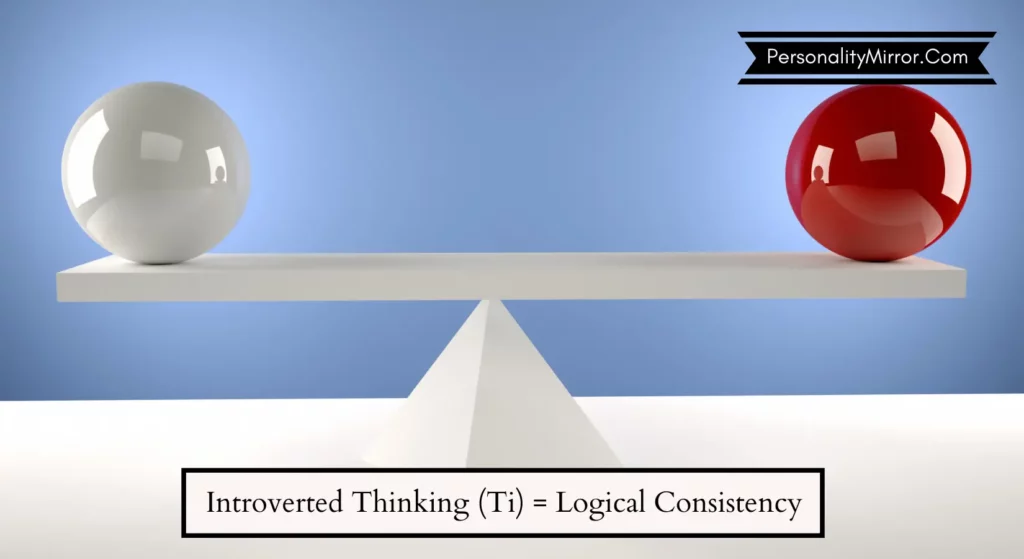
More examples of Ti accuracy – Selection of precise words for enhanced suitability, natural preference towards raw, unadulterated things, considering the decimal portions where possible, avoiding rounding off actual figures, seeking uncomfortable truths instead of comforting lies.
Weakness – Over-Thinking
Though Introverted Thinking (Ti) helps INFJs pursue accuracy, it also leads to overthinking by endlessly engaging the INFJ in a Ni-Ti loop. Over-expectations from the Ti child lead to overthinking.
You have Hero Introverted Intuition (Ni), the most potent cognitive function of the INFJ stack. But, its power is limited to the extent of what it can serve. It’s a perceiving function, and it can help you gain perspectives and meaning in life. But, decision-making is not an aspect of Introverted Intuition (Ni).
When it comes to logical understanding, Introverted Thinking(Ti) is the only primary cognitive function that the INFJ can strongly rely on, as Extraverted Thinking (Te) is the weakest shadow function for INFJs. (We will touch upon Te in the coming section)
But Introverted Thinking (Ti) plays the Child role and is weak compared to the intense and powerful Ni Hero.
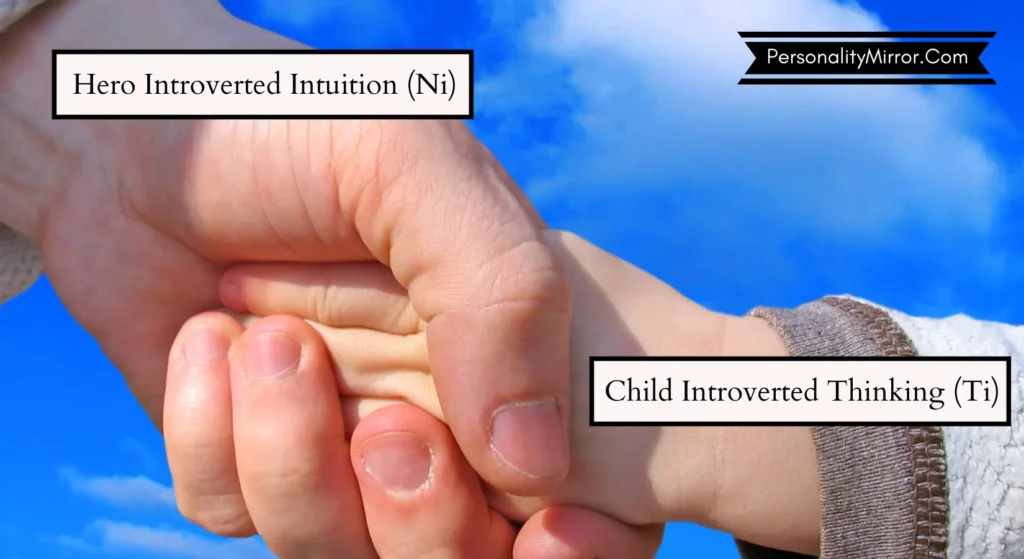
So, don’t expect Introverted Thinking (Ti) to move at the same speed and intensity as your Hero Ni. It can never possibly happen. You can develop Introverted Thinking (Ti) to a certain extent through consistent, deliberate practice. However, you will still find it weaker when you compare it with the rich deep insights that your Hero Ni delivers.
The key to getting rid of overthinking is to accept that your Child Ti is weak, and it needs more time and energy to logically process information than Ti primary users (ESTP, ISTP, INTP, ENTP). Therefore, unless you interact with the world and learn new perspectives using your Extraverted functions, you will keep on overthinking.
What is the overall impact of Introverted Thinking (Ti) in the INFJ personality type?
Introverted Thinking (Ti) helps you to find purpose in life. It enables you to understand why people act in a certain way and the underlying reasoning behind every single thing in the world.
Introverted Thinking (Ti) brings clarity to your life and helps you find unique solutions that never existed before. It adds a creative edge to your personality and enables you to stand apart from the crowd.
Introverted Thinking (Ti) helps you verify and dissect a system and find its logical loopholes. In addition, it offers you whistleblowing capabilities and the courage to stand your ground.
Extraverted Thinking (Te)
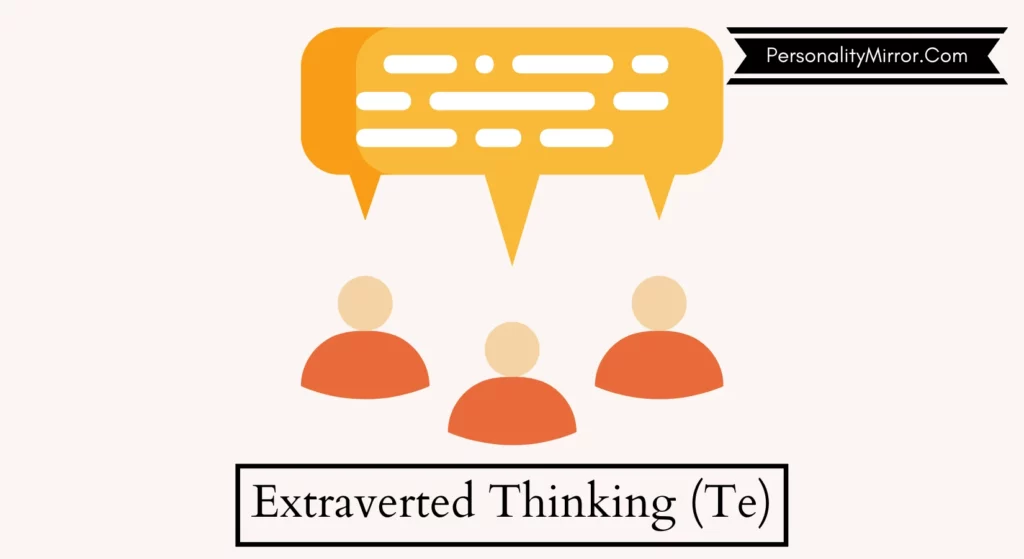
What is Extraverted Thinking (Te)?
Extraverted Thinking (Te) is a judging function that uses external logic to make judgments and decisions.
Extraverted Thinking (Te) is based upon a logic-based approach that relies upon externally verifiable empirical evidence rather than theory or pure logic.
The term ‘Extraverted’ in ‘Extraverted Thinking (Te)’ signifies that the decision-making process is externally focused and visible to others. Personality types with Extraverted Thinking (Te) in their primary function stack use strategy, tactics, systems, processes, and a goal-based approach to logical conclusions.
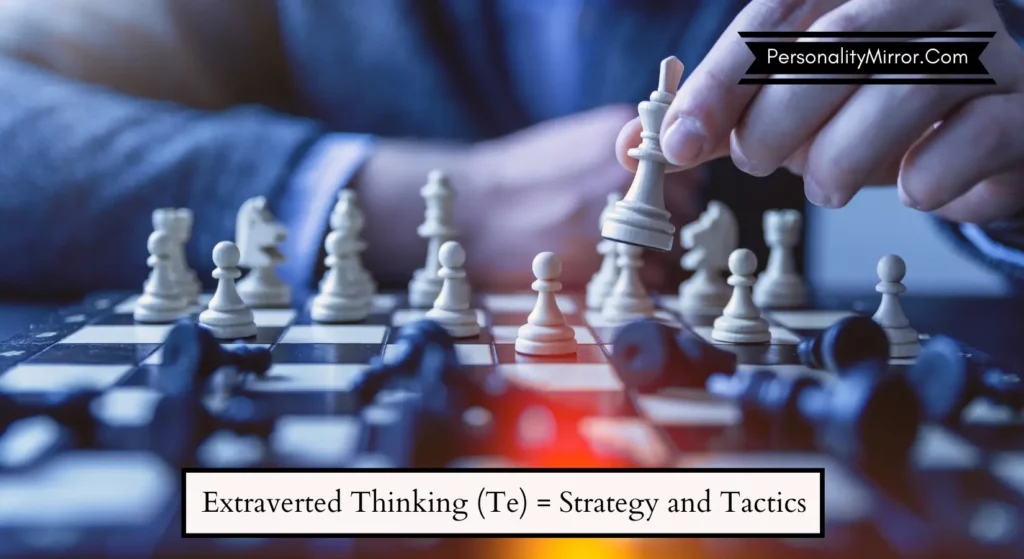
The best way to differentiate Introverted Thinking (Ti) and Extraverted Thinking (Te) is that Ti is more of an experimental logic that focuses on accuracy. In contrast, Te is a commonly used pragmatic logic that focuses on implementation.
Extraverted Thinking (Te) helps you plan how events will eventually play out in the external world. Extraverted Thinking (Te) is based upon measurement, regulation, delegation, and enforcement of systems and protocols to attain a particular goal.
As we discussed before, Extraverted Feeling (Fe) absorbs the individual feelings (Fi) and understands the world of how people feel. Similarly, Extraverted Thinking (Te) considers the best tried and tested logic (Ti) that is most efficient to use and can fetch guaranteed results.
Personality types who have Extraverted Thinking (Te) in their primary function stack find it challenging to tap into their shadow Introverted Thinking(Ti). Thus, it becomes difficult for them to internally ascertain and verify a logic. So, they trust a widely accepted logic that is socially practiced and use it to achieve their goals.
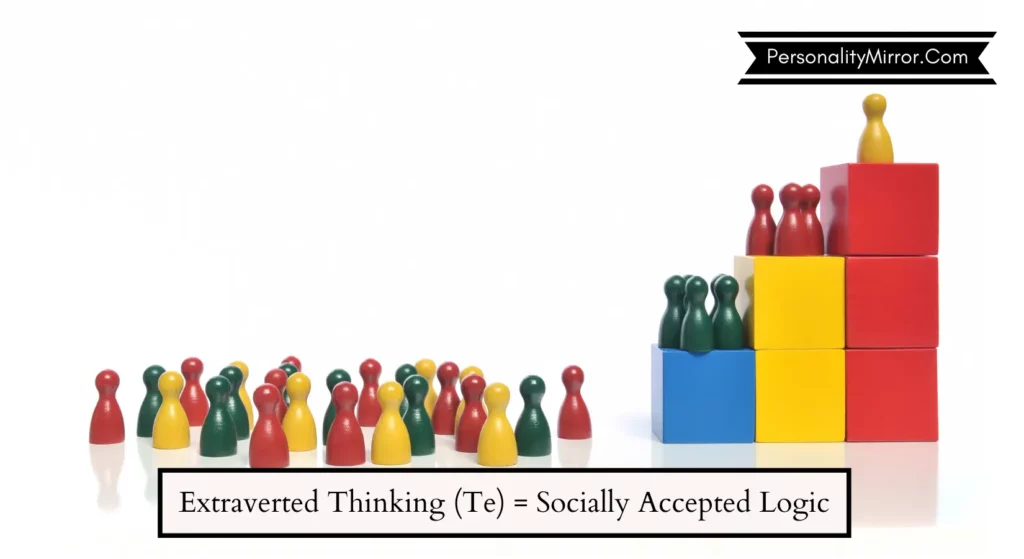
Role of Extraverted Thinking (Te) in the INFJ personality type
Extraverted Thinking (Te) plays the role of ‘Trickster’ in the INFJ personality type. It’s the weakest cognitive function that an INFJ can tap into, and INFJs usually use it for manipulation and deceit.
In a trickster role, extraverted Thinking (Te) plays mischief by creating double binds and deceiving the externally logical standpoint to evade obstacles.
Extraverted Thinking (Te) trickster deceives the world by coming up with logically sounding excuses and prevents you from following your plans and strategy. It invariably questions and challenges the external logic even though it’s actually efficient and relatively correct.
Let’s discuss the strengths and weaknesses that Extraverted Thinking (Te) can offer to the INFJ personality.
Strength, Weakness and Overall Impact of Extraverted Thinking (Te) in the INFJ personality type
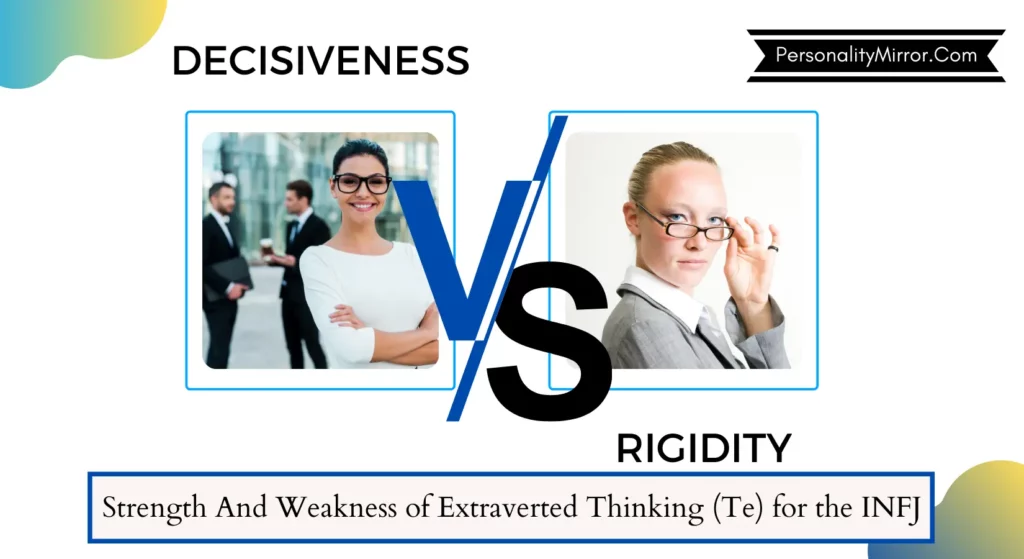
Strength – Decisiveness
Decisiveness comes with Extraverted Thinking (Te). As a Child Ti user, you love playing with ideas and understanding their implications. But when it comes to achieving a goal, you need a realistic plan that you can follow through.
INFJs develop Extraverted Thinking (Te) once they attain maturity. It requires a conscious effort for the INFJ to tap into this function and start making decisions.
INFJs prefer a logically correct world, where the same reasoning applies to all, fostering equality. When you find existing systems and widely accepted practices that promote discrimination, inequality, and injustice, you reject the associated external logic (Te) altogether. And it leads you to actively avoid going out into the world and assert your decisiveness. You act in a way telling the world that you’re not a part of this faulty system.
But, if you do enough research on the history and the nature of human civilization, you will realize there’s a reason behind every thought and every action that we do. It’s not required for you to blindly follow the external logic (Te) that everyone else is following, but you must understand why things work in a certain manner. And once you gain an intuitive, logical understanding, you will become more decisive by setting healthy boundaries.
To grow and move forward in your life, you need the active engagement of Extraverted Thinking (Te). Te gives you the ability to achieve goals and stay decisive in the face of obstacles.
Weakness – Rigidity
Extraverted Thinking (Te) plays a blind role for INFJs. INFJs either use it totally or leave it entirely aside. It’s hard for an INFJ to be flexible at using it. Poor time management is a result of it.
When exercising control, INFJs become rigid to the point of not entertaining any other logic apart from what they have planned to follow. It leads to internal stress and external disputes. It doesn’t help INFJs earn a noble reputation for themselves, and you become a Villain like Adolf Hitler in the eyes of the world.
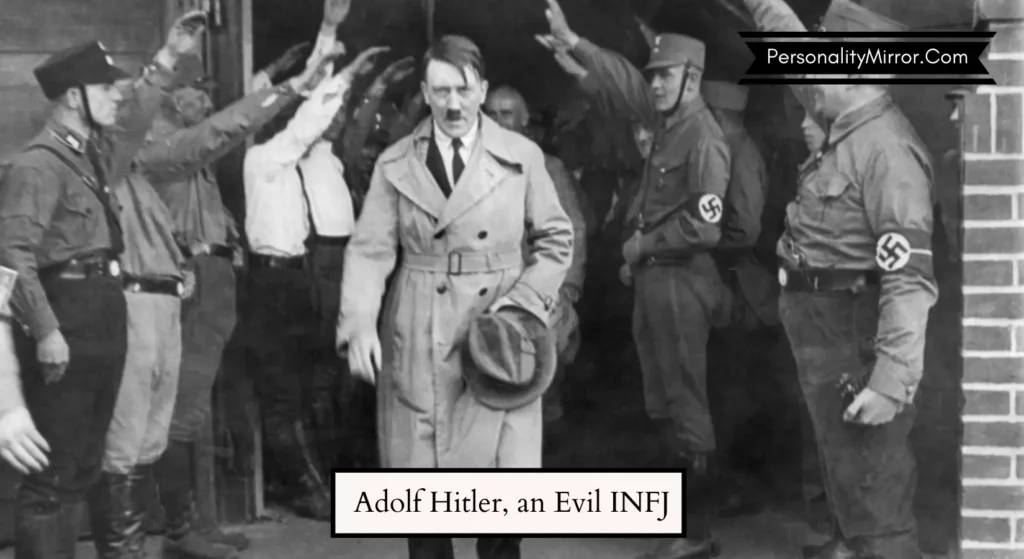
To avoid being rigid, use your Child Ti to verify systems and practices that look new to you. When things look challenging, you may start to overthink entering the Ni-Ti loop. But the key is to begin implementing a system on a trial basis and strike a balance between your internal understanding (Ti) and an existing efficient system (Te) that gets your work done.
What is the overall impact of Extraverted Thinking (Te) in the INFJ personality type?
It’s a hard pill to swallow when your logic gets challenged. Especially for personality types (IxFJs) who have naturally very little access to tap into Extraverted Thinking (Te) aspects, you tend to become defensive when your logic gets rejected by others.
Rejecting the external logic (Te) doesn’t help you grow. Instead, it keeps you stuck in the Ni-Ti loop as you struggle to figure out everything on your own accord. So as you seek help in the external world, you engage your Extraverted Thinking (Te) to understand how people think through a common logic and how it gets them results.
Reading books, seeking advice, learning from others, and quietly observing common thinking patterns help you understand the external thinking viewpoint.
Extraverted Thinking (Te) coupled with Introverted Sensing (Si) brings discipline and dedication to your life. Running in the default mode, INFJs won’t get aggressive with goal-setting and implementation. But, you have the power to tap into this mode using your Te. It may seem a new and unexplored territory to you, but it works in a manner that you might never have been acquainted with before.
The key is to push yourself consciously into activities that develop Extraverted Thinking (Te) capabilities.
Conclusion
In this post, we discussed all the judging INFJ functions starting from Extraverted Feeling (Fe), Introverted Feeling (Fi), Introverted Thinking (Ti) to Extraverted Thinking (Te). First, let’s have a concise recap of all the judging INFJ functions:
Extraverted Feeling (Fe) – Understanding others’ Feelings and actively considering them before making decisions.
Introverted Feeling (Fi) – Understanding own emotions, feelings, and desires to make decisions.
Introverted Thinking (Ti) – Understanding logical calculations and finding logical consistency in decision making.
Extraverted Thinking (Te) – Understanding how the world thinks and using systems to make decisions.
There’s much more than what we have discussed in this post. The goal of this article was to make you aware of the meaning, roles, strengths, and weaknesses of each of the INFJ functions.
Share your thoughts, opinions, and learning experiences in the comments below. I will appreciate it. Also, if you have any doubts about INFJ cognitive functions, let me know in the comments.
If you enjoyed this post, don’t forget to check these!
The 4 Perceiving INFJ Cognitive Functions: A Meaningful Comprehensive Understanding